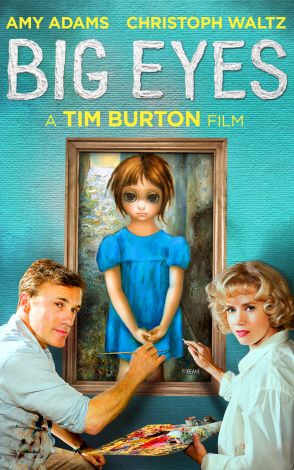
Once upon a time, there was good reason to get excited when a new Tim Burton film hit the screens: Darkly stylized, wickedly funny, and slightly surreal, Burton's inspired early efforts displayed genuine vision -- the kind that's impossible to fake. Then, somewhere between Sleepy Hollow and Planet of the Apes, that vision seemed to abandon him. Yes, Burton still managed to dazzle and delight on occasion, but in devoting his energies toward stories that had been told time and again (Charlie and the Chocolate Factory, Sweeny Todd: The Demon Barber of Fleet Street, Alice in Wonderland) instead of such original fables as Beetlejuice and Edward Scissorhands, familiarity began to eclipse the spark of creativity that ignited his career. Now, after falling flat on his face with the truly abysmal Dark Shadows and resurrecting his early short Frankenweenie as a feature film, Burton is back with Big Eyes, a fact-based drama that might be his most personal movie since the Oscar-winning Ed Wood.
The story opens in the late '50s, as Margaret (Amy Adams) packs up her car with her daughter and their personal belongings, and leaves her husband to start a new life in San Francisco. There, she quickly reconnects with her old friend DeeAnn (Krysten Ritter) and falls head over heels for Walter Keane (Christoph Waltz), a charming artist and part-time real-estate broker who is quickly taken with her unique paintings of small children with strikingly expressive, saucer-like eyes. Before long the two are married, and Walter is claiming credit for Margaret's popular paintings. With the money rolling in, Margaret initially agrees to go along with the ruse, but the closer she gets to her new husband, the more she begins to realize that he's little more than a smooth-talking scam artist. Later, riddled with guilt over the fact that she's been deceiving her own daughter as her paintings become a pop-culture phenomenon, Margaret leaves the abusive Walter and moves to Hawaii. Only then does she gain the confidence to reclaim the works that have been credited to her husband, even though doing so entails going before a judge and proving that she alone created the enchanting children with the big eyes.

At first glance, Big Eyes contains almost none of the qualities typically found in "A Tim Burton Film": The outdoor scenes unfold against sun-drenched backdrops, whimsy is kept to a minimum, and Johnny Depp is nowhere to be seen. In fact, aside from the Danny Elfman score and a nightmarish scene set inside a grocery store, there is precious little on the surface that would indicate Burton's involvement at all (except for his name in the credits). A closer look at the movie's prominent theme of plagiarism, however, may offer the biggest clue as to why a man whose recent career has focused on remaking old stories and properties chose to tell this particular tale. With the collaboration of Ed Wood scribes Scott Alexander and Larry Karaszewski, Burton makes sure that the story unfolds with compassion, wit, and humor. From the moment we first meet Margaret we're rooting for her to succeed, and Adams instills her with a mix of vulnerability and hidden strength that wins our sympathy, even when she's sacrificing her principles in the name of profit. Her nuanced performance is the beating heart of Big Eyes, and it stands in stark contrast to her co-star Waltz, who relishes his role as the "brains."
From the moment Walter first approaches Margaret at an art show, there's an element of manipulation to his character, even if the recently separated mother fails to recognize it. The more complex their relationship grows, the more Alexander and Karaszewski's screenplay becomes a penetrating study in emotional abuse -- one that's made all the more effective due to Waltz's seductive and charismatic performance. Much like Margaret, we want to believe that Walter's motivations are genuine, yet it's easier for us to see the selfishness behind her new husband's toothy smile. That darkness is present nonetheless, and Burton should be commended for the way he subtly brings it to the forefront with the help of his writers and actors. And though it's ultimately Waltz who steals the show as the increasingly unhinged Walter, Danny Huston and Terence Stamp are also effective as, respectively, the journalist who aids his rise and the critic who accelerates his fall. So while all of this authenticity might appear to contradict Big Eyes' themes of deception and artifice, it serves as a reminder that Burton is at his best when he's willing to break out of his comfort zone to tell a more personal story, rather than recycle old material.
